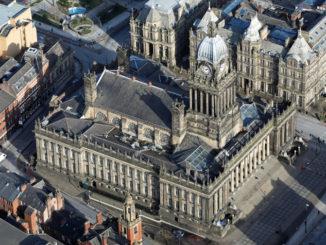
Leeds Clean Air Zone is no longer required, Leeds City Council announced today (13 October).
The decision follows a joint government and city council review which found that air quality improvements, driven by businesses switching to cleaner vehicles faster than expected, had made the scheme redundant.
Instead the council will look at bringing in new air quality targets that go further than the national standards.
The review found that more than 90% of buses and 80% of HGVs driven in the city now use cleaner Euro-6 engines and therefore wouldn’t be charged if a zone was introduced.
In addition nearly half of the city’s licensed taxi and private hire cars are also now hybrid or electric.
Because of the significant shift to cleaner vehicles, the review found that air pollution in Leeds on key routes is below legal limits and is not likely to exceed them again — even if traffic were to return to ‘normal’ levels or slightly higher.
Transport infrastructure improvements and the rise in ultra-low emission vehicles in Leeds have further accelerated improvements to the city’s air quality, the council added.
The council has written to the government requesting to keep £6.9m of CAZ funding that the city had previously secured, to help it maintain air quality improvements.
Read more
- Plummeting pollution levels prompt Leeds and Sheffield to review CAZ plans
- Leeds Clean Air Zone plan “suspended for foreseeable future”
- Leeds City Council joins Birmingham in call for clean air zone postponement during Covid-19
The money would be used to continue offering grants to help local businesses switch to cleaner vehicles.
Leeds also aims to keep and repurpose the ANPR camera infrastructure installed to monitor and enforce the CAZ.
The council said that in the “unlikely” event that the city’s air quality declines in the future it will seek support from central government to introduce a CAZ using the existing infrastructure.
Councillor James Lewis, deputy leader for Leeds City Council said: “Thanks to our city’s collective effort, Leeds residents are breathing air that is cleaner and safer than ever before.
“When we consulted on the CAZ in 2018, we said that we hoped that no one would be charged because businesses would switch to less polluting vehicles before the charging system takes effect. That is exactly what has happened.
“We have achieved the aims of the Clean Air Zone without having to charge a single vehicle. If Leeds were to introduce a CAZ today, only a fraction of vehicles would be affected because the vast majority of businesses are now driving cleaner vehicles than they were just a few years ago.
“While we celebrate that our air is cleaner than ever, and cleaner than some other UK cities, this council also recognises that air pollution remains the biggest environmental threat to our health.
“That’s why we’re considering voluntarily introducing even stricter targets for Leeds, aligned with WHO guidelines. We will continue working hard to protect the health of everyone in Leeds from the effects of polluted air.”
Chris Ashley, the RHA’s spokesman on the environment, said: “News of this decision will come as a huge relief to hard-pressed businesses serving Leeds during the Covid-19 pandemic. Better ways exist to achieve the clean air we all want, and I am pleased that the review by Leeds has taken account of non-charging alternatives such as transport infrastructure improvements.
"Hauliers have invested £1.9bn in the latest cleanest lorries which has seen NOx pollution fall by around 60% since 2013. At a time of rising unemployment and a highly uncertain economic outlook, I urge the government and councils like Manchester to make other choices.
"The RHA has consistently said that we need clear standards that allow businesses to invest with confidence in the clean vehicles desired. It is the consistent improvement of standards over time that has driven the large falls in pollution.”
“Green recovery” ambitions must be sustainable and supported by sensible policies that nurture economic growth, he added.













